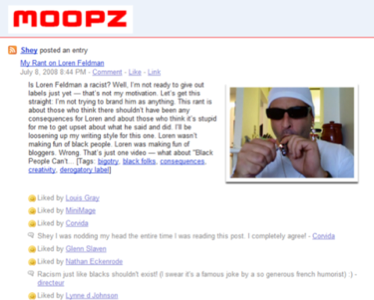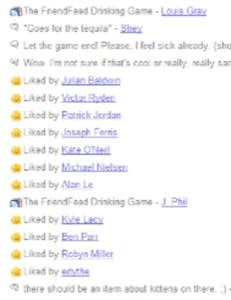Moopz is a new web service created by the fabulous Mark Carey, the same developer responsible for RWW’s innovative FriendFeed/comment integration. With Moopz, Carey brings us a conversation-tracking interface for FriendFeed that lets you keep tabs on what’s hot, what’s recent, as well as what’s quiet (dare we saying “upcoming?”). The interface is very similar to FriendFeed – you can interact with the stories by liking and commenting, but the big difference between the two services is that Moopz helps organize and categorize the FriendFeed noise into an easy-to-read flow of news.

What’s Moopz?
On Moopz, the social media flow is categorized into three main areas: recently active conversations, popular conversations, and quiet conversations. Upon login (you authenticate with your FriendFeed remote key), you’ll see the recently active conversations listed on the homepage. On the right side of the homepage in the sidebar, the currently popular conversations are listed at the top and the quiet conversations are listed at the bottom. In the middle of the sidebar is a tag cloud. Each item that comes across FriendFeed is semantically tagged based on its content and those tags are displayed in proportion to the number of stories they represent. (The biggest tag so far? “FriendFeed” of course).

How Moopz Reduces FriendFeed’s Noise
However, what’s truly innovative and unique about Moopz is the way in consolidates the distributed activity across all of FriendFeed. One of my personal biggest pet peeves about FriendFeed is that the biggest conversations seem to only take place in the top users’ streams. Those conversations might take place about an article a lesser-known blogger wrote, but because these FriendFeed super-users have more fans, the conversation will surround their sharing of the article via Google Reader instead of the blog post shared by the small-time blogger.
And if you are the blogger and aren’t savvy enough (or just too busy) to track the numerous shares of the article, then you miss out on hearing the conversation taking place. Some people have unfortunately framed this problem as a desire to “own” the conversation, but that couldn’t be more wrong. It’s a desire to be a part of the conversation no matter where it’s happening. There was a time when that conversation happened almost entirely on the blog itself. That’s no longer the case.

In any event, by consolidating the stream of noise, Moopz also democratizes FriendFeed conversations. On FriendFeed, popular items are shared by multiple people and conversations then arise around those items. Moopz aggregates those conversations and “likes” into a single combined thread. This also helps eliminate the problem of duplicates on FriendFeed – all the multiple sharings are consolidated be them bookmarks, Google Reader shares, tweets, etc.
A FriendFeed-Flavored Techmeme
This actually makes Moopz the “fair” version of Techmeme. While Techmeme is an amazing service that lets you keep up with the hottest news, its headlines are often from the A-List. On Moopz though, any item from any site can become a popular item – all that matters is that it has the most FriendFeed activity. Also, when you’re viewing the page for a popular article, the first few sentences of the article are extracted, which encourages people to actually click through and read the article instead of blindly liking or commenting.
A Story on Moopz

Moopz is definitely a great new way to interact with FriendFeed – it doesn’t have to take the place of using FriendFeed itself, but we think several of you will agree: this is FriendFeed done right.
Disclosure: Mark Carey does ongoing consulting work for ReadWriteWeb. However note that Moopz is an independent product and RWW has no affiliation with it.

















